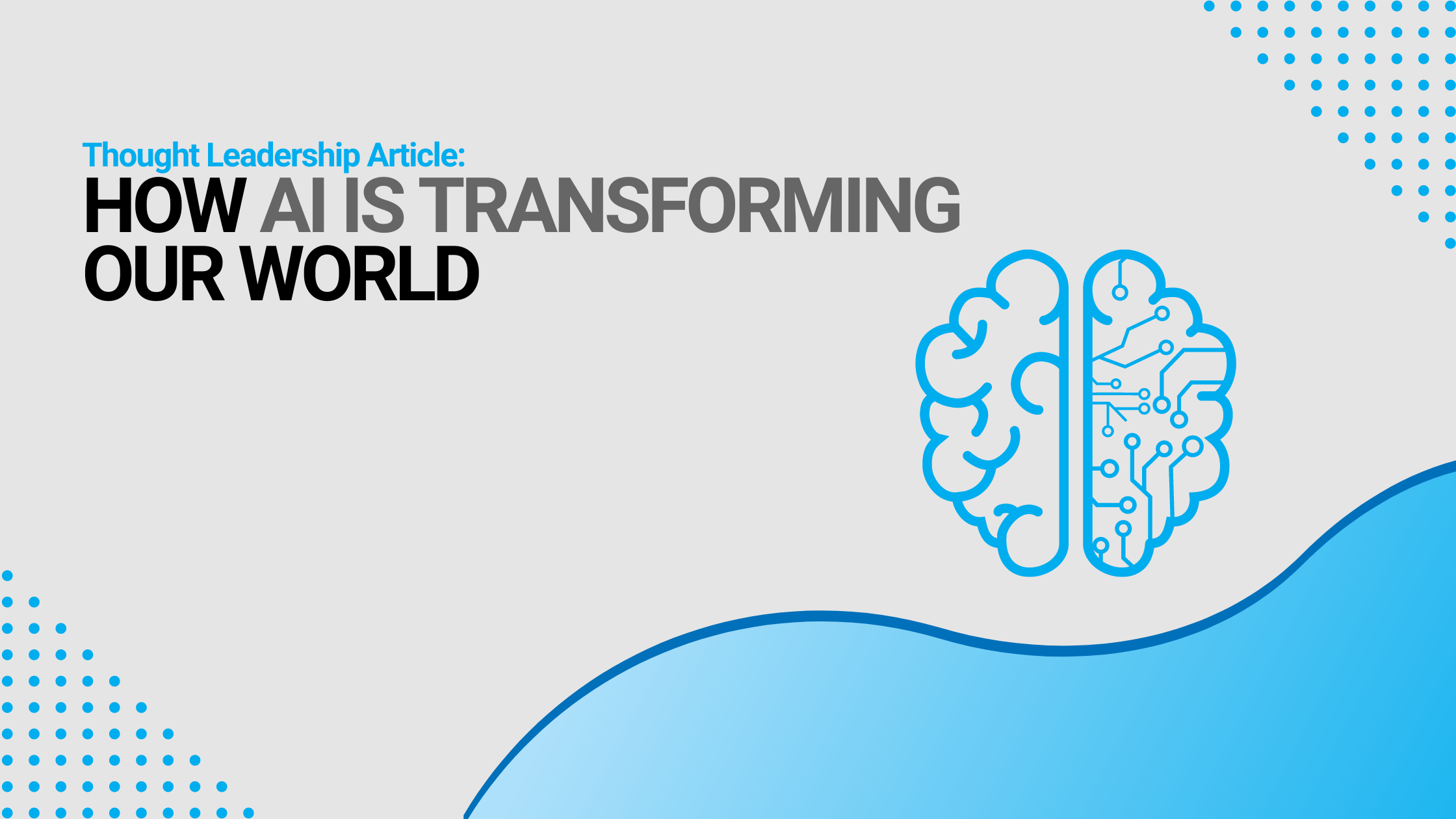
It’s safe to say that artificial intelligence (AI) is one of the most groundbreaking technologies that not only is transforming a variety of industries, but also is reshaping how we interact with the world. For those unclear as to what AI actually entails, in the most basic terms, it is the simulation of human intelligence by machines. The machines capable of this task are more particularly computer systems that perform tasks that typically require human intellect, such as learning, reasoning, and self-correction. Additionally, there are also more technical areas like machine learning, natural language processing, and robotics that collectively enhance AI systems' capabilities, but we’ll get to those later. First, let’s discuss more about what AI can do.
The Multifaceted Potential of AI
AI's potential is vast and multifaceted in that it can do things like automate routine tasks, offer deep insights through data analysis, enhance decision-making processes, and create new avenues for innovation. From virtual assistants that respond to our queries, to algorithms predicting market trends, AI has been integrated into our daily lives and business operations. For instance, I used AI to ask AI about what AI can do for this article. It told me that “understanding AI's fundamentals and applications is essential for organizations aiming to remain competitive in today’s fast-paced world.” So, let’s learn more…
A Brief History of AI
To paint a better picture of AI, let’s break down how it started and how we got to where we are now with a quick timeline:
- 1950: Alan Turing published “Computing Machinery and Intelligence,” introducing the Turing Test to evaluate machine intelligence.
- 1956: The term “Artificial Intelligence” was coined at the Dartmouth Conference.
- 1961: Unimate, the first industrial robot, revolutionized manufacturing.
- 1966: ELIZA, an early natural language processing program, was created.
- 1997: IBM's Deep Blue defeated world chess champion Garry Kasparov.
- 2011: IBM's Watson won Jeopardy!, showcasing AI's natural language processing prowess.
- 2016: Google's AlphaGo defeated a world champion Go player, highlighting AI's strategic capabilities.
- Present: AI is advancing in healthcare, finance, and personalized customer experiences, with ongoing ethical considerations and regulatory developments.
How AI Works
Now that you know some of the history of AI, you might still be asking yourself, “how does it all work?” Allow us to explain in six simple steps.
- Data Collection: First, AI gathers data from a multitude of sources.
- Data Processing: Then, before AI can use that data, it must be cleaned and prepared for analysis.
- Model Training: AI then uses algorithms to learn from data patterns.
- Model Evaluation: Once the model is trained, its performance is assessed using validation data.
- Deployment: After that, the model can be implemented in real-world applications.
- Feedback and Improvement: Finally, AI systems will continuously update the model based on new data.
It will also help to understand the key components of AI which are:
- Neural Networks: Layers of nodes (neurons) processing data, crucial for tasks like image and speech recognition.
- Machine Learning (ML): Algorithms enabling computers to learn from data.
- Deep Learning: Advanced ML using multi-layered neural networks for complex data analysis.
It’s worth mentioning that not all AI is created equally. In fact, there are different types of AI, such as Narrow AI, which is designed for specific tasks, like a Google search or the facial recognition you use to open your iPhone. Another popular type of AI is General AI. That is an AI system capable of performing any task a human can, with autonomous problem-solving abilities. Examples of General AI are chatbots or autonomous vehicles like those created by Tesla and Uber. Finally, there’s Superintelligent AI that basically lives up to its name in that it’s a theoretical AI that surpasses human intelligence in all areas, including creativity and wisdom. Yeah, we’re talking about the “Terminator” but remember that’s only theoretical… for now.
AI in Work and Everyday Life
Now that we have a better understand of AI, let’s get to the really good stuff like how AI is revolutionizing work in various industries. Because we’re Charles IT, let’s focus on finance, manufacturing, and healthcare sectors.
In terms of the finance industry, one of the more helpful things AI algorithms can do is monitor transactions in real-time to identify unusual patterns that might indicate fraudulent activity. In other words, it will save you money if, for example, your debit card happens to get lost or stolen. It can also make you money too, in that AI-driven systems can analyze market trends, news, and economic indicators to make informed decisions about buying and selling stocks.
When it comes to the manufacturing industry, AI can help with actual equipment. That’s because AI systems can analyze data from sensors embedded in machinery to predict when equipment is likely to fail or require maintenance. That means manufacturers can get ahead of equipment malfunctions. Then, there are the self-driving cars that we previously mentioned, that use a combination of sensors, cameras, and machine learning algorithms to navigate roads, recognize obstacles, and make driving decisions without an actual human driver.
As for the healthcare industry, you might say AI can save lives since systems can analyze medical data, such as images, lab results, and patient histories, to assist in diagnosing diseases more accurately and more quickly. For example, AI can detect early signs of cancer in medical imaging. Of course, a doctor still must make that official call but when they do, AI can thereafter process vast amounts of patient data to develop personalized treatment plans. It’s also worth noting that in the pharmaceutical sector, AI allows for less animal testing by using advanced computational models and simulations to predict drug efficacy and safety, instead of relying on animal trials for preliminary testing.
While all of that is certainly very important, AI doesn’t just benefit work. In fact, you can have some fun with it in your everyday personal life too. For instance, next time you have a movie night, watch something that Netflix suggested for you because that’s AI picking content based on your viewing habits. Let’s not forget the more obvious digital assistants like Siri and Alexa that many of us use at both on the go and at home. They are powered by AI to do things like answer your questions, turn on your lights, or play some music.
The Benefits and Challenges of AI
With that said, it’s clear that AI offers numerous benefits, like every manager’s favorite - boosting efficiency. For instance, AI can automate repetitive tasks like data entry, which at a business can free up employees to focus on more complex and creative work.
AI also drives innovation by enabling new solutions. That’s those previously mentioned personalized treatments in healthcare or the advanced trading strategies in finance. These innovations improve current processes and open up new opportunities for growth.
Another benefit of AI is how quickly it can analyze large amounts of data and find insights that humans might miss. This leads to more accurate forecasts, better strategic planning, and improved decision-making in various sectors. For example, AI can predict market trends or identify patient health risks.
Now, let’s get to the challenges of AI because with any new technology, there are some pitfalls. For one, AI can reflect and amplify biases in its training data, which can lead to unfair outcomes. An example of that is that biased hiring algorithms might favor certain groups over others.
Then there’s the issue of privacy. AI uses lots of personal data, so companies must follow privacy laws and inform users about data collection and usage. Certain businesses also don’t want their private information out on the internet, which can happen when using certain AI platforms. For example, in May 2023 the company Samsung banned its employees from using ChatGPT after employees uploaded some sensitive code and internal meeting notes to the platform, which then leaked onto the internet.
Unfortunately, another big drawback of AI is that it can lead to loss of jobs. The more AI automates many tasks, the less people are needed to do those tasks in some areas. However, AI can also lead to the creation of new roles that require advanced technical skills, if workers can adapt to new technologies and acquire different talents.
To conclude, there’s still the question of who exactly is responsible for AI since as it becomes more independent, it's unclear who is responsible for its actions. If an AI makes a mistake, it's difficult to determine if the fault lies with its developers, operators, or deploying organizations. And yes, it makes mistakes. In fact, a 2023 study done by Purdue University found that ChatGPT is wrong 52% of the time when asked computer programming questions. As Charles IT, CEO and founder Foster Charles puts it, you can liken AI platforms like ChatGPT to those who appear on the game show Jeopardy! “People answer Jeopardy! all the time and they think they’re right. They connected some dots that shouldn’t connect so it’s working very similarly to it,” Charles explained. He added, “It’s like a really smart friend, 80% of the time they’re right but like even Jeopardy! people, they’re hitting that buzzer thinking they know the answer and people are wrong.”
The Future of AI
So where do we go from here? As AI continues to advance, it will change many different parts of our lives. When looking ahead to future trends in AI, we can expect even more advanced machine learning, which will improve models for more accurate predictions. There will also likely be a better integration with the Internet of Things (IoT), which will revolutionize how we interact with technology like that found in smart homes or connected healthcare systems. Natural language processing is anticipated to improve as well, leading to smarter communication tools like virtual assistants. Additionally, there is a growing focus on creating ethical AI systems that are fair and transparent.
Overall, AI is also expected to continue to significantly impact industries by increasing efficiency and driving innovation. It’ll presumedly contribute to economic growth by creating new markets and job opportunities. It may be surprising that AI is expected to promote environmental sustainability as well, through better energy management and conservation efforts. There will probably even be AI-powered educational tools that will offer tailored learning experiences, making education more accessible. AI has the potential to bridge information gaps and provide equal access to resources, but it could also widen inequalities if not managed properly.
So, while we may not all have a Rosey the Robot from “The Jetsons” doing our housework or Optimus Prime from “Transformers” saving the world, we have progressed substantially with artificial intelligence to conclude that we really are living in the “future.”




